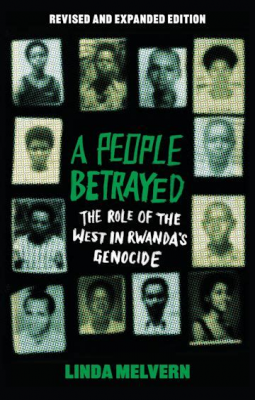A PEOPLE BETRAYED - Linda Melvern, Zed Books

It is easy to despair of the United Nations while mass atrocities occur around the world. However, Linda Melvern's authoritative study of the 1994 Rwandan genocide reminds us that it is the individual states on the UN Security Council that choose to prevent it from enforcing its own resolutions. In the case of Rwanda, diplomats representing the UK, US and France actively stopped its own peacekeeping force from taking effective action that might have prevented the slaughter before it began.
For months, General Romeo Dallaire, the UN peacekeeping force commander in Rwanda, warned UN HQ about arms caches, hate speech, discriminatory laws, militia training and lists of opponents being compiled. The UK high commissioner in neighbouring Uganda reported to London on the increasing violence, as did aid agencies. Thirty years later, Bill Clinton continues to pretend his administration had not receive a stream of detailed intelligence about the military buildup in Kigali. For decades, the French denied that they trained the Hutu Power killers, armed them throughout the 100 days of slaughter, and protected them when they lost ground to the mainly Tutsi Rwandan Patriotic Army of Paul Kagame.
In the case of the Bisesero massacre, French troops enticed 1,000 Tutsi out hiding, promising to rescue them. The French then disappeared, allowing the Hutu Power genocidaires to "finish their work." France continues to give refuge to 100 ideologues who masterminded the genocide and committed mass murder. The UK protects five genocidaires on the grounds that they would not receive a fair trial in Rwanda. Yet, under universal jurisdiction, those five could be tried in the UK, if the British government chose. (Using this legal mechanism, Germany has recently convicted a member of Islamic State for the slaughter and enslavement of Yezidis in northern Iraq).
Melvern has just updated her magisterial study of the genocide. This book provides meticulously researched detail on the complicity of the international community in the death of an estimated 800,000 members of the Tutsi minority and Hutu moderates. Before the killing began, General Dallaire daily asked the UN to allow him to seize the massive Hutu Power arms caches. This was refused because in Somalia, in 1993, American soldiers died trying to seize illegal arms supplies (featured in the film, Black Hawk Down).
Dallaire asked for reinforcements, believing an international show of force would deter the Hutu Power killers from continuing with their genocidal plans. The commander thought that just 5,500 troops could have achieved this aim. Diplomats from the US, UK and France denied Dallaire troops or resources, choosing inaction. It took weeks for them to even allow Rwanda to be discussed. America refused to jam the radio station broadcasting instructions to the Hutu militia on the grounds that it would be against free speech.
There is no reason to believe the international community learned from its mistakes in Rwanda. The deliberate targeting and attempted elimination of ethnic and religious minorities continues in Sudan, Myanmar, Nigeria, China, the DRC, India and Pakistan, to name but a few places where the UN seems toothless. Yet, as Melvern makes clear, it is not for the want of UN resolutions.
The UK has learned nothing: the Foreign Office recently reversed itself by no longer calling the 2003-6 slaughter in Darfur a genocide. Lord David Alton has repeatedly proposed legislation allowing the UK to make an initial genocide determination by referring mass atrocity situations to the High Court. The Conservative government insisted that only an international court could make such a determination. Yet, in Catch 22 fashion, the UK would not refer any case to a competent international court, presumably for fear of offending trading partners. Let us hope the Labour Government takes a more enlightened view.
A PEOPLE BETRAYED by Linda Melvern is published by Zed Books and widely available from different booksellers.


















